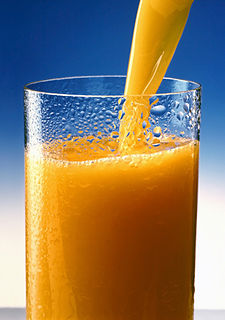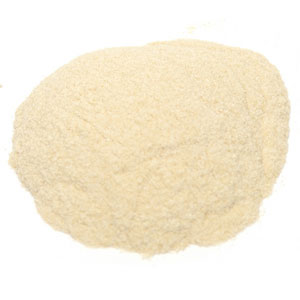
Orange juice is a liquid extract of the orange tree fruit, produced by squeezing oranges. It comes in several different varieties, including blood orange, navel oranges, valencia orange, clementine, and tangerine. As well as variations in oranges used, some varieties include differing amounts of juice vesicles, known as "pulp" in American English, and "(juicy) bits" in British English. These vesicles contain the juice of the orange and can be left in or removed during the manufacturing process. How juicy these vesicles are depend upon many factors, such as species, variety, and season. In American English, the beverage name is often abbreviated as "OJ".

Squash, in British English, is a non-alcoholic concentrated syrup used in beverage making. It is usually fruit-flavoured, made from fruit juice, water, and sugar or a sugar substitute. Modern squashes may also contain food colouring and additional flavouring. Some traditional squashes contain herbal extracts, most notably elderflower and ginger.

Mentos is a brand of prepackaged scotch mints sold in stores and vending machines. First produced in the Netherlands in 1948, it is currently sold in more than 130 countries worldwide by the Italian corporation Perfetti Van Melle. The mints are small oblate spheroids, with a slightly hard exterior and a soft, chewy interior.

Minute Maid is a product line of beverages, usually associated with lemonade or orange juice, but which now extends to soft drinks of many kinds, including Hi-C. Minute Maid is sold under the Cappy brand in Central Europe and under the brand "Моя Семья" in Russia and the Commonwealth of Independent States. Minute Maid was the first company to market orange juice concentrate, allowing it to be distributed throughout the United States and served year-round. The Minute Maid Company is owned by The Coca-Cola Company, the world's largest marketer of fruit juices and drinks. The firm opened its headquarters in Sugar Land Town Square in Sugar Land, Texas, United States, on February 16, 2009; previously it was headquartered in the 2000 St. James Place building in Houston.

Squirt is a caffeine-free, grapefruit-flavored, carbonated soft drink, created in 1938 in Phoenix, Arizona.

V8 Vegetable Juice, sometimes just called V8, is a trademarked name for a number of beverage products sold worldwide that are made from eight vegetables, or a mixture of vegetables and fruits. Since 1948, the brand has been owned by the Campbell Soup Company.

Fruit Roll-Ups is a brand of fruit snack that debuted in grocery stores across America in 1983. The snack is a flat, pectin-based fruit-flavored snack, wrapped around a piece of cellophane for easier removal.

Hot Tamales is a chewy, cinnamon flavored, oblong-shaped candy introduced in 1950 — manufactured and marketed in the United States by Just Born, a family-owned, Pennsylvania-based candy company.

Club is the brand name for a series of Irish carbonated soft drinks produced in Ireland by Britvic Ireland and previously by Cantrell & Cochrane (C&C). It is bottled by the Britvic plant in Dublin. The series includes Club Orange, Club Lemon, Club Rock Shandy and Club Apple soft drinks.

Hi-C is a fruit juice-flavored drink made by the Minute Maid division of The Coca-Cola Company. It was created by Niles Foster in 1946 and released in 1947. The sole original flavor was orange.

The Simply Orange Juice Company is a company in Apopka, Florida, that was founded in 2001 and is a brand of The Coca-Cola Company. It makes a number of not-from-concentrate orange juices and other juice drinks and fruit juices that are sold refrigerated in a distinctive clear plastic bottle and green twist top with a large green seal. The bottles have a wide body that starts tapering to a narrow neck at the top of the label.

Halls is the brand name of a popular mentholated cough drop. Halls cough drops are sold by the Cadbury-Adams Division of Cadbury, now owned by Mondelēz International, and have long been advertised as featuring "Vapor Action". Halls was first made in the 1930s in Stanley Road, Whitefield, Lancashire, United Kingdom by the Halls Brothers company, founded 1893 by Thomas Harold Hall and Norman Smith Hall. Halls Brothers was acquired by Warner-Lambert in 1964. Production in Whitefield ceased in the late 1980s. When Pfizer acquired Warner-Lambert in 2000, the Halls brand came with the entire Adams portfolio. Two years later, Adams was bought out by Cadbury, who were subsequently purchased by Kraft foods, which was later restructured and renamed Mondelēz International - as of 2015, Mondelēz International owns the Halls brand worldwide.

Fruit Gushers, commonly known as Gushers, are American fruit candy snacks in the shape of elongated hexagonal bipyramids, made primarily from sugar and fruit juice, with small amounts of other ingredients.
Izze is the brand name of a line of carbonated juice drinks produced by the IZZE Beverage Company in Boulder, Colorado, which is owned by PepsiCo. The drinks consist of 70% fruit juice from concentrate, and 30% seltzer water. Izze is an all-natural, no-preservatives-added fruit soda.
Fruit2O, formerly manufactured by Kraft, is a lightly flavored, non-carbonated water beverage introduced in 1999. Fruit2o was introduced to compete not only with the bottled water market but also with the soft drink market. Sunny Delight Beverages purchased the Veryfine Products line from Kraft in 2007.

Monster Beverage Corporation is an American beverage company that manufactures energy drinks including Monster Energy, Relentless and Burn.
Fanta is a global brand of fruit-flavoured soft drink from the Coca-Cola Company. There are over 90 flavours worldwide; however, most of them are only available by region in some countries.

Sunkist is a brand of primarily orange flavored soft drinks launched in 1979.





















